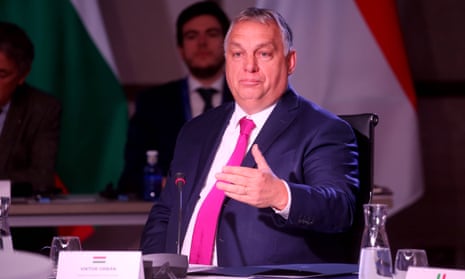Hungary’s prime minister, Viktor Orbán, will travel to Moscow on Tuesday in a visit that has drawn criticism from the country’s political opposition and is being watched nervously in other European capitals.
Orbán, who has developed a reputation as Vladimir Putin’s closest ally inside the European Union, is due to meet the Russian president just as other EU leaders are trying to hash out a coordinated position on Russia’s menacing moves around Ukraine’s borders.
“In this tense situation, it is simply treasonous to go to Moscow,” said a statement released on Sunday and signed by representatives of the six opposition parties that have joined forces to face Orbán in April elections.
Orbán first came to public attention in 1989 when, as a young democracy activist, he called on Soviet troops to leave the country. But during his time as prime minister over the last 12 years he has cultivated warm relations with Putin, at the same time as his relations with Brussels have become ever more fractious.
Nathalie Loiseau, the chair of the European parliament’s subcommittee on security and defence, said it was clear Putin was trying to divide Europe. “I sincerely hope that Viktor Orbán is aware of what is at stake, and that he sticks to the EU’s message of unity,” she said at a press conference late last week, according to Hungarian news outlets.
The UK’s defence minister Ben Wallace struck a more positive note on a visit to Budapest on Monday, expressing support for Orbán’s trip. “We need to de-escalate this and stand up for the right for sovereignty of Ukraine,” Wallace said at a joint press conference with his Hungarian counterpart Tibor Benko.
Péter Szijjártó, Hungary’s foreign minister, said last week the agenda for Orbán’s visit would include Hungarian gas purchases from Russia, production of Russia’s Sputnik Covid vaccine in Hungary and discussions on a long-delayed nuclear plant Russia is building in the country.
While France and Germany have been notably less hawkish on Russia than the US and Britain, they have loudly condemned the Kremlin’s aggressive military manoeuvres. Orbán, on the other hand, has remained pointedly quiet about the military build-up on Ukraine’s borders, except to say he is “in favour of peace and de-escalation”, in a statement released after a gathering of European far-right leaders in Madrid over the weekend, hosted by Spains’s Vox party.
Szijjártó has painted the current Ukraine stand-off as a dispute between Russia and the west in which Hungary wants to take no part, despite the fact that it is a Nato member. “Nobody can request such a thing from us,” Szijjártó told a pro-government newspaper, commenting on demands that Budapest should cool relations with Moscow.
Hungary was the first European country to purchase Sputnik, which has not yet been licensed for use by the European Medicines Agency. Budapest has also regularly pushed back against closer cooperation between Ukraine and Nato, ostensibly over concerns about the treatment of the Hungarian minority in the country.
In a sign of just how rosy the relationship is with the Kremlin, at a time when most European capitals describe relations as at a worrying low point, last November Putin awarded Szijjártó the Order of Friendship at a ceremony in Moscow.
András Simonyi, a former Hungarian ambassador to the US who is now a non-resident fellow at the Atlantic Council, said that previously there were many people in the Hungarian foreign ministry who were deeply suspicious of Orbán’s friendly behaviour towards Russia, but over the years this has changed, as critics were gradually replaced with loyalists.
“Hungary does not have a foreign policy, Viktor Orbán has a foreign policy. Everyone in Orbán’s government is just a staffer, and this is especially true for foreign policy,” he said.
Orbán’s recent support for the Bosnian Serb leader, Milorad Dodik, has also raised eyebrows across Europe, and has widely been seen as a favour to Russia. Dodik has in recent months intensified secessionist rhetoric around the Republika Srpska entity inside Bosnia, to the alarm of much of the international community.
Orbán flew to the Republika Srpska capital, Banja Luka, in November to meet Dodik, without stopping over in Sarajevo. He has promised to veto any EU sanctions against Dodik.
“There isn’t any EU member state doing anything even slightly similar: it’s a systemic abandonment of the EU foreign policy alliance,” said Péter Krekó, who runs the Political Capital thinktank in Budapest.
Alongside his clashes with Europe, Orbán also has poor relations with the Biden administration. Hungary was the only EU nation not invited to Biden’s recent democracy summit. Instead, Orbán has retained warm relations with Donald Trump. Earlier this month, Trump endorsed Orbán ahead of the April elections, and there are rumours he may come to Budapest to campaign for the far-right prime minister.
The 1956 uprising, which was crushed by Soviet tanks, remains a vivid part of the national consciousness, and is one factor that makes many in the country uneasy about Orbán’s support for Putin, at a time when a further Russian incursion into Ukraine may be possible.
“A prime minister who, in such a situation, remains silent and springs up to go to Moscow when he’s signalled to do so with a snap, only to stand on the edge of the carpet in the Kremlin, betrays the interests of both Hungary and Europe,” read the opposition statement.
